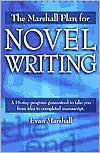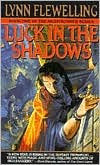Saturday, September 02, 2006
Reviews of SOMETIMES THE MAGIC WORKS and THE MARSHALL PLAN
The two books on writing that I've read most recently were both very worthwhile. Over the past few months, it seems almost any book I read on writing is worthwhile. This might be partly due to the progress I've made in my work: as I advance my skills, I get more out of such books, can understand them on a deeper level, can make associations between the ideas they contain and my own experience as well as concepts from other such books. I know not every book on writing is worthwhile, of course, but these two definitely are.
I'll try to keep my review brief (not easy for me) by giving you the most important idea I gleaned from each of these two books, or the main impression that I received.
Terry Brooks' book, SOMETIMES THE MAGIC WORKS, struck me as saying more than anything else that success as an author is due not only to one's talent, but to a significant extent also to GOOD LUCK.
He was in the right place at the right time when he connected with Lester del Ray, who chose his manuscript to use as an example in his own quest to show that Fantasy, as a genre, can sell and sell big (this was back in the 70's when the genre was still seen as something of an oddity).
I did not receive the impression that Mr. Brooks' manuscript was extraordinary by any means. He indicated it needed significant rewriting and revision and that he learned a lot in the process. It is not that he presented them with a polished, finished mansucript that they were able to print "as is" and which was of such high quality that it sold a gazillion copies on its own. The editors helped him transform his writing into a publishable manuscript and also went out of their way to promote it, to create an overnight success.
I am sure Mr. Brooks has learned a great deal about writing over the years and has become a much better writer over time than the one he started out as. I appreciated his openness in sharing these details, which I would otherwise have never known. His experience strikes me as offering hope for others, that you can be less than perfect and somehow still make it, with a little help. Every aspiring writer struggles with self-confidence, so this message is appreciated. I think it is also fair: everyone needs a little help here or there in life.
It also strikes me that so much of this is a matter of chance. An aspiring writer needs to connect with the right editor or agent at the right time. I'm sure it must be so, as this notion has been reflected in so many other books on writing that I've read over the years.
With so much left open to chance, to GOOD LUCK, a very talented writer producing a quality manuscript is not guaranteed it will find its way into print, even though editors and agents typically scream that they are always hungry for a good manuscript. It needs to be not only a good manuscript, but the right one at the right time in the hands of the right person.
I suppose the only remedy to this for an aspiring writer who believes in the quality of his work is to be patient and keep trying, so as to maximize the opportunity of presenting a quality example of his/her work to the right person at the right time. It also reinforces the idea that you have to be willing to do the hard work, to learn and grow, to become a skilled writer if you are not one already. Otherwise, you will be a one-hit wonder with a short writing career.
Mr. Brooks' book does not give a lot of deail on how to do this, compared with THE MARSHALL PLAN, but it does provide a lot of insights into the experiences of one successful author's career, and to the career aspect of writing for those who are otherwise preoccupied with the nitty-gritty details of point of view, developing complications, etc. Mr. Brooks does list 10 rules, and does give some good advice scattered throughout. His best advice deals with the importance of the challenge that the main character faces. For a more in-depth look at how to develop a story, write and edit it, a book such as the following one will be of much more use.
Evan Marshall's book, THE MARSHALL PLAN, struck me as a very solid introduction or review of the principles of good writing. Of particular value in this book were the examples later in the book about how to edit your writing. Mr. Marshall gives specific examples of original text and edited text which illutrate very clearly the types of mistakes that beginners often make, and how they can be corrected. While one can question some of this advice, in general I would say he is 100% correct. Even those points which I thought to question were usually accompanied by a disclaimer specifying when, for example, the rule might be broken.
This material is invaluable and EVERY ASPIRING WRITER SHOULD READ THIS SECTION OF THIS BOOK!!! It will help you tighten up your prose and keep your story moving along quickly without the clutter of unnecessary phrases or words. I could remember being aware of some of these issues when I was writing the complete draft of my current novel, and wondering how I should handle some things. I worked out the best approach I could find, but frankly didn't know what I was doing on some points. After reading Mr. Marshall's book, I was able to go back through my chapters and edit them, removing a lot of unnecessary clutter. It felt liberating, and I had a very solid sense that I KNEW what I was doing was right, that the advice I had picked up from THE MARSHALL PLAN was of the highest quality. The guy knows what he's talking about! (Check below in recent postings on my blog for some examples.)
Back to work, I have editing to do!
Adrian
Subscribe to:
Post Comments (Atom)








2 comments:
Hello Adrian, I'm always on the look out for new books on writing, so I'm going to look for those books.
Right now I've got four books on writing on the go. Writing the Breakout Novel by Donald Maass, How to Grow a Novel by Sol Stein, Characters, Emotion & Viewpoint by Nancy Kress and Plot and Structure by James Scott Bell. The first and the last are the most engaging reads, but the other two are interesting as well.
Nice hearing from you, Susan! Thanks for mentioning the books you are reading. I'll keep an eye out for them.
Probably you are like me on this, always reading books about writing as well as doing my own writing. I used to think it was a waste of time, either you know how to write or you don't, or have you have talent or not. Wow, was I wrong! Such books, as well as classes, writing groups, etc., are indeed VERY helpful. No one is born knowing how to write, even if one is born with talent. It takes hard work, and learning about the craft, as well as reading to understand what has been done by others, what works, what it is you are shooting for in your own writing.
Post a Comment